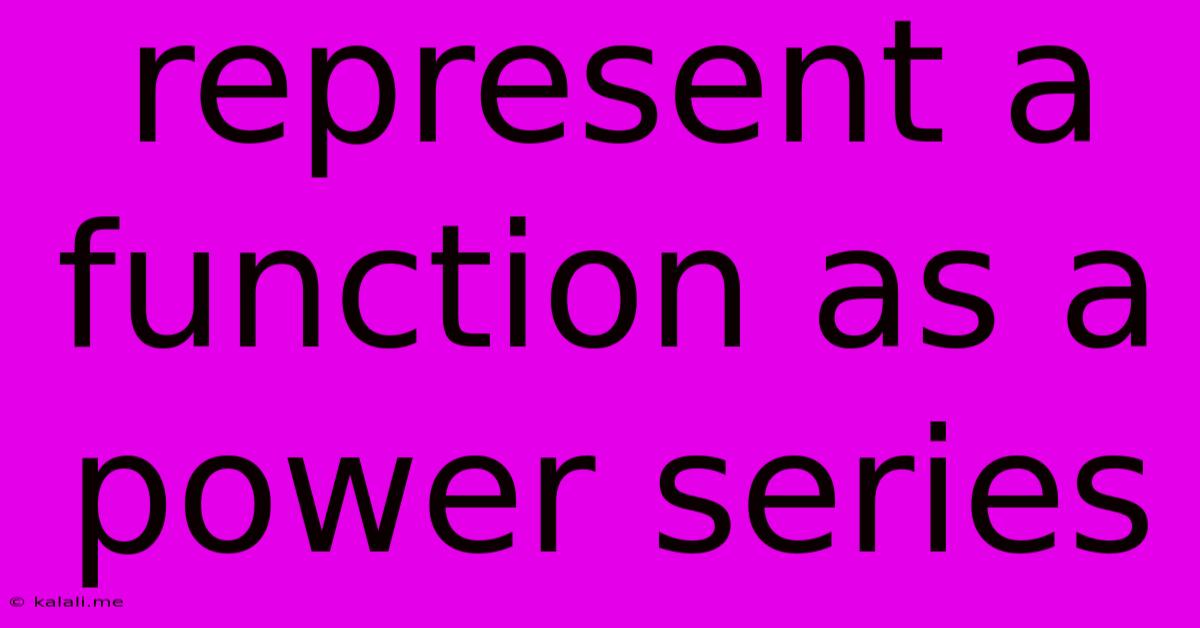Represent A Function As A Power Series
Kalali
May 10, 2025 · 3 min read

Table of Contents
Representing a Function as a Power Series: A Comprehensive Guide
This article explores the fascinating world of representing functions as power series, a powerful technique in calculus with applications across numerous fields, including physics, engineering, and computer science. Understanding this concept allows for approximation of complex functions using simpler polynomial expressions, facilitating easier computations and analysis. We'll cover the fundamental concepts, methods, and applications of power series representations.
What is a Power Series?
A power series is an infinite series of the form:
∑_(n=0)^∞ c_n(x - a)^n = c_0 + c_1(x - a) + c_2(x - a)^2 + c_3(x - a)^3 + ...
where:
c_nare constants called coefficients.xis a variable.ais a constant called the center of the series.
The power series converges for some values of x and diverges for others. The set of all x for which the series converges is called the interval of convergence. Determining this interval is a crucial step in utilizing power series representations.
Methods for Representing Functions as Power Series
Several techniques exist for expressing a function as a power series. The most common methods include:
1. Taylor Series and Maclaurin Series
The Taylor series represents a function as an infinite sum of terms, each involving a derivative of the function at a specific point. The formula for the Taylor series of a function f(x) centered at a is:
∑_(n=0)^∞ (f^(n)(a) / n!)(x - a)^n
If the center a is 0, the series is called a Maclaurin series. These series provide a powerful way to approximate functions using polynomials. The accuracy of the approximation increases as more terms are included.
Example: The Maclaurin series for e^x is:
∑_(n=0)^∞ (x^n / n!) = 1 + x + (x^2 / 2!) + (x^3 / 3!) + ...
2. Geometric Series
The geometric series provides a simple yet powerful example of a power series. A geometric series has the form:
∑_(n=0)^∞ r^n = 1 + r + r^2 + r^3 + ...
This series converges to 1/(1 - r) if |r| < 1 and diverges otherwise. This seemingly simple series can be used as a building block to derive power series representations for other functions through manipulation and substitution.
3. Manipulation and Substitution
Once you have the power series representation of a known function, you can often derive the series for related functions using algebraic manipulation such as substitution, differentiation, and integration. For example, knowing the Maclaurin series for e^x, you can derive the series for e^(x^2) by substituting x^2 for x.
Applications of Power Series Representations
Power series have wide-ranging applications, including:
-
Approximating function values: Evaluating complex functions can be computationally expensive. Power series provide a way to approximate function values efficiently, particularly when only a few terms are needed for sufficient accuracy.
-
Solving differential equations: Power series solutions are a standard technique for solving ordinary differential equations, especially those without closed-form solutions.
-
Numerical integration and differentiation: Power series can be used to approximate integrals and derivatives, simplifying complex calculations.
-
Physics and engineering: Power series are essential tools in analyzing physical phenomena, such as oscillations, heat transfer, and fluid dynamics.
-
Computer science: Power series are used in computer algorithms for approximating functions and solving equations.
Conclusion
Representing functions as power series is a fundamental concept in advanced mathematics with significant practical applications. Mastering this technique opens doors to solving complex problems and gaining a deeper understanding of mathematical functions and their behavior. Through the Taylor and Maclaurin series, geometric series, and skillful manipulation, we can express a vast array of functions as power series, unlocking their potential for approximation and analysis in various fields. Remember to always consider the interval of convergence to ensure the validity of your approximations.
Latest Posts
Latest Posts
-
How Much Protein In 8 Oz Of Chicken
Jul 04, 2025
-
R C Cola And A Moon Pie
Jul 04, 2025
-
If I Was 18 What Year Would I Be Born
Jul 04, 2025
-
One And Three Hundred Twenty Four Thousandths
Jul 04, 2025
-
How Much Is 2 Pounds Of Cream Cheese
Jul 04, 2025
Related Post
Thank you for visiting our website which covers about Represent A Function As A Power Series . We hope the information provided has been useful to you. Feel free to contact us if you have any questions or need further assistance. See you next time and don't miss to bookmark.